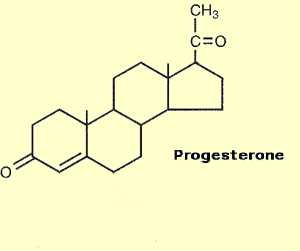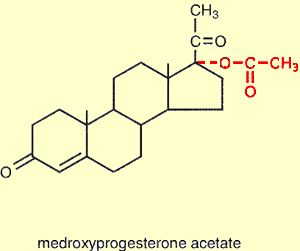 Hormone Therapy Increases Breast Cancer Says JAMA Study,
Hormone Therapy Increases Breast Cancer Says JAMA Study,
by Jeffrey Dach MD
Synthetic Progestin Found to Cause Breast Cancer
A new study published in the October 2010 issue of Journal of the American Medical Association (JAMA) reviewed 11 years of data from the Womens Health Initiative Study. (1)
Dr.Chlebowski, concluded that the synthetic Prempro Pill used in the study increases breast cancer, and these cancers tend to be the more aggressive. As might be expected, there was also increased breast cancer mortality in the synthetic hormone group. Note: PremPro is made by Wyeth (Pfizer) and is a combination of a horse estrogen- Premarin plus progestin-Provera (medroxyprogesterone).
In an accompanying editorial, Dr Bach comments this finding is old news, and the increased breast cancer from Progestin, a synthetic hormone, was not surprising to him. Previous studies had anticipated the effect.(2)
Censorship in The Media – Why Can’t They Tell You About Progesterone ?
What I find incredible is that neither of the two JAMA articles nor anything in the news media mentions the fact that Progestins are chemicalized, altered versions of Progesterone. Nor do any of these articles even mention one word about Progesterone, which is the original human hormone that the drug companies are trying to copy. The synthetic copy is called a Progestin, an inferior, “monster” hormone that causes breast cancer. Progesterone is safer and more effective than any of the chemically altered progestins. So why not use progesterone? None of the articles say this. I find this form of self-censorship to be astounding. Doctors reading this JAMA article will not even think that Progesterone exists. It does exist. It is even FDA approved as Prometium. Why the silence?
Bioidentical Hormones Are Safer and More Effective Than Synthetics
Progesterone, a bioidentical hormones, is preferable compared to synthetics. Firstly, the WHI Study (Women’s Health Initiative Study) showed that synthetic hormones cause cancer and heart disease. If you look at the second arm of the WHI study, (which did not include a synthetic progestin), the breast cancer risk is significantly decreased. The cardiac risk was also decreased.
Therefore, the Progestin Was the Culprit
The culprit was the synthetic progestin called Provera, known for years to cause cancer and heart disease. As a matter of fact, three previous studies showed the same finding, that progestins cause breast cancer.
1) The Breast Cancer Detection Demonstration Project (BCDDP) had an increase in breast cancer when they used a progestin. ref:JAMA. 2000;283:485-491 .
2) The Swedish Record Review had increase in breast cancer with a progestin.
3) The Million Woman Study had increase in breast cancer with progestin use.
In all these studies, they were using Progestins along with the estrogen, and that’s why they got those results. (Progestins are chemically altered synthetic forms of progesterone).
Examples of a chemically altered hormone (see below):
Medroxyprogesterone acetate is a modified version of progesterone, Chemical modification in RED below:
Above left: Bioidentical progesterone…Above Right: chemical modification in RED
A Progestin is NOT Progesterone
Progestin is not the same as bioidentical progesterone. In fact, Progestins are “chemicalized ” versions of progesterone. The chemical structure is altered to get a patent. That’s why they are so bad for your health. They have been altered chemically.
Breast Cancer Rates Fall After Women Abandon Synthetic Hormones
Secondly, when the WHI results were made public, prescriptions for synthetic hormones dropped and breast cancer rates plummeted. Two separate studies showed these findings: Both in a Canadian Study and a US Study (April 2007 NEJM), data showed plummeting breast cancer rates after the 2002 WHI study prompted massive numbers of women to abandon synthetic hormones.
Bioidentical Hormones Are Not Associated with Breast Cancer
The French Cohort Study concluded that bioidentical progesterone was preferable to the synthetic progestins. They showed no increased risk of breast cancer in bioidentical hormone users (compared to the general population). (3)
French Cohort- How Did They Do The Study? What Did They Find?
The French Cohort Study was done in France. Patient Questionnaires were filled out by 80,000 women. Over the eight years of follow up, they found 2,354 cases of invasive breast cancer among 80,377 postmenopausal women. They found that, for the Bioidentical Hormone users (using estrogen plus progesterone), the risk of breast cancer was the SAME or identical to HRT-Never-Users (the same as the general population).
However, for Synthetic Hormone users (estrogen plus progestin), the incidence of breast cancer was increased by 70 per cent. Sound familiar? The authors concluded that it was preferable to use progesterone rather than progestin. Doing so avoids the increased risk of breast cancer associated with the Synthetic Progestins in the PremPro Pill used in the WHI study (also called Provera-medroxyprogesterone).
Articles with Related Content:
The Safety of Bioidentical Hormones by Jeffrey Dach MD
The Importance of Bioidentical Hormones by Jeffrey Dach MD
Jeffrey Dach MD
7450 Griffin Road Suite 190
Davie, Florida 33314
954-792-4663
https://jeffreydachmd.com/
http://www.drdach.com/
http://www.naturalmedicine101.com/
http://www.truemedmd.com/
http://www.bioidenticalhormones101.com/
Links and References
(1) http://jama.ama-assn.org/cgi/content/abstract/304/15/1684
Estrogen Plus Progestin and Breast Cancer Incidence and Mortality in Postmenopausal Women – Rowan T. Chlebowski, MD, PhD; Garnet L. Anderson, PhD; Margery Gass, MD; Dorothy S. Lane, MD; Aaron K. Aragaki, MS; Lewis H. Kuller, MD; JoAnn E. Manson, MD, DrPH; Marcia L. Stefanick, PhD; Judith Ockene, MD; Gloria E. Sarto, MD; Karen C. Johnson, MD, MPH; Jean Wactawski-Wende, PhD; Peter M. Ravdin, MD, PhD; Robert Schenken, MD; Susan L. Hendrix, DO; Aleksandar Rajkovic, MD, PhD; Thomas E. Rohan, PhD; Shagufta Yasmeen, MD; Ross L. Prentice, PhD; for the WHI Investigators
JAMA. 2010;304(15):1684-1692. doi:10.1001/jama.2010.1500
Participants were randomized to receive conjugated equine estrogens, 0.625 mg/d, and medroxyprogesterone acetate, 2.5 mg/d, in a single tablet (Prempro; Wyeth Ayerst, Collegeville, Pennsylvania) or an identical-appearing placebo pill.
Following the initial report of results from the WHI trial,1 a substantial decrease in breast cancer incidence occurred in the United States, which was attributed24-25 to the marked decrease in postmenopausal hormone therapy use that occurred after publication of the trial results.26 The adverse influence of estrogen plus progestin on breast cancer mortality suggests that a future reduction in breast cancer mortality in the United States may be anticipated as well.
In intention-to-treat analysis, estrogen plus progestin compared with placebo increased the incidence of invasive breast cancer (385 cases [0.42% per year] vs 293 cases [0.34% per year], respectively; HR, 1.25; 95% confidence interval [CI], 1.07-1.46; P = .004). Figure 2 also shows quintiles of duration of study intervention based on time of participant entry into study and cessation of study intervention.
A significantly larger fraction of breast cancers presented with positive lymph nodes in the combined hormone therapy group compared with the placebo group (81 [23.7%] vs 43 [16.2%], respectively; HR, 1.78; 95% CI, 1.23-2.58; P = .03).
In conclusion, use of estrogen plus progestin increases the incidence of breast cancer, and the cancers are more commonly node-positive. Mortality data analyses suggest that breast cancer mortality may also be increased.
(2) Postmenopausal Hormone Therapy and Breast Cancer
An Uncertain Trade-off Peter B. Bach, MD, MAPP
JAMA. 2010;304(15):1719-1720. doi:10.1001/jama.2010.1528
In this issue of JAMA, Chlebowski et al report results of an 11-year follow-up of WHI estrogen-progestin trial participants that address many of these questions. The authors found that hormone therapy increases the frequency of breast cancer and that the breast cancers are on average more advanced and may be larger.
That breast cancer rates in the WHI increased among women receiving hormone therapy was not surprising. Epidemiological and biological studies had anticipated the effect,5
(3) Unequal_Risks_Breast_Cancer_hormone_replacement_E3N_French_cohort_study_Fournier_2008
French Cohort Study Breast Cancer Res Treat. 2008 January ; 107(1): 103–111.
Unequal risks for breast cancer associated with different hormone
replacement therapies: results from the E3N cohort study
Agnès Fournier1, Franco Berrino2, and Françoise Clavel-Chapelon1,* 1E3N, Nutrition, hormones et cancer: épidémiologie et prévention INSERM : ERI20, IFR69, Université Paris Sud – Paris XI, EA4045, Institut Gustave-Roussy 39 rue Camille Desmoulins 94805 Villejuif CEDEX,FR.
News Media Reports
http://www.washingtonpost.com/wp-dyn/content/article/2010/10/19/AR2010101907522.html
Hormones also raise death risk of cancer
By Rob Stein Washington Post Staff Writer
Wednesday, October 20, 2010
Several experts stressed, however, that the breast cancer risk is not associated with estrogen use alone, which women who have had hysterectomies can take.
http://www.nytimes.com/2010/10/20/health/20hormone.html?src=mv
Breast Cancer Seen as Riskier With HormoneBy DENISE GRADY
Published: October 19, 2010 Hormone treatment after menopause, already known to increase the risk of breast cancer, also makes it more likely that the cancer will be advanced and deadly, a study finds.
http://online.wsj.com/article/SB10001424052702303550904575562511374951120.html
Research Finds Hormone Therapy Speeds Up Breast-Tumor Growth .
By JENNIFER CORBETT DOOREN
Women who contracted breast cancer after using combination hormone-replacement therapy were diagnosed at a more-advanced stage of the disease than women who didn’t take hormones, according to new findings from the landmark Women’s Health Initiative study.
http://www.reuters.com/article/idUSTRE69I5ZP20101019
Hormone therapy raises breast cancer deaths: study
By Julie Steenhuysen CHICAGO | Tue Oct 19, 2010 7:11pm EDT
Sales of U.S. market leader Wyeth’s combined estrogen plus progesterone pill Prempro have fallen by about 50 percent since 2001 to around $1 billion a year. Wyeth is now owned by Pfizer.
TWICE AS MANY CANCER DEATHS
Chlebowski’s team analyzed data on the more than 12,000 women in the study. They found twice as many taking HRT died from breast cancer — 2.6 per 10,000 per year versus 1.3 per 10,000 women per year — compared to women who took a placebo.
Nearly 24 percent of the breast cancer patients who took HRT had tumors that had spread to the lymph notes, compared with 16 percent of women taking placebos.
“All the scary cancers with unfavorable prognoses were also increased,” Chlebowski said, citing increases in aggressive forms of breast cancer, and not just estrogen-fed cancers that are easier to treat.
“And then for the first time we show deaths from breast cancer are significantly increased as well,” he said.
http://jama.ama-assn.org/cgi/content/full/304/15/1719
Postmenopausal Hormone Therapy and Breast Cancer
An Uncertain Trade-off Peter B. Bach, MD, MAPP
JAMA. 2010;304(15):1719-1720. doi:10.1001/jama.2010.1528
Jeffrey Dach MD
7450 Griffin Road Suite 190
Davie, Florida 33314
954-792-4663
https://jeffreydachmd.com/
http://www.drdach.com/
http://www.naturalmedicine101.com/
http://www.truemedmd.com/
http://www.bioidenticalhormones101.com/
Disclaimer click here: www.drdach.com/wst_page20.html
The reader is advised to discuss the comments on these pages with his/her personal physicians and to only act upon the advice of his/her personal physician. Also note that concerning an answer which appears as an electronically posted question, I am NOT creating a physician — patient relationship. Although identities will remain confidential as much as possible, as I can not control the media, I can not take responsibility for any breaches of confidentiality that may occur.
Link to this article:http://wp.me/P3gFbV-9X
Copyright (c) 2013 Jeffrey Dach MD All Rights Reserved. This article may be reproduced on the internet without permission, provided there is a link to this page and proper credit is given.
FAIR USE NOTICE: This site contains copyrighted material the use of which has not always been specifically authorized by the copyright owner. We are making such material available in our efforts to advance understanding of issues of significance. We believe this constitutes a ‘fair use’ of any such copyrighted material as provided for in section 107 of the US Copyright Law. In accordance with Title 17 U.S.C. Section 107, the material on this site is distributed without profit to those who have expressed a prior interest in receiving the included information for research and educational purposes.




Pingback: Synthetic Hormones Cause Breast Cancer - Jeffrey Dach MD